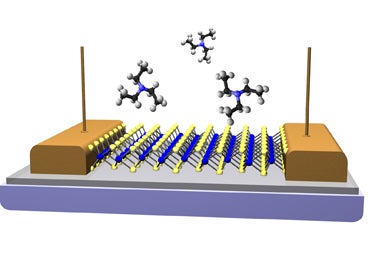
US Naval Research Laboratory (NRL) scientists have developed a new chemical vapour sensor using single monolayer of molybdenum disulfide (MoS2) on a silicon dioxide wafer, for application in future nanoscale electronic devices.
Highly selective and reactive to a range of analytes, the new MoS2-based sensor provides sensitive transduction of transient surface physisorption to the electrical resistance of the monolayer channel.
Capable of rapidly recovering upon vapour removal, the new sensor has been tested to demonstrate its ability to conduct electrical charge when exposed to a variety of analytes.
During testing, the two-dimensional (2D) MoS2 sensor was exposed to a variety of analyte vapours, including common industrial chemicals and solvents, as well as by-products, simulants or precursors for explosives and nerve agents.
Conducted by the NRL research team, the trials showed that the MoS2 channel’s conductivity changed significantly to a few specific analytes. The monolayer MoS2 sensor’s response polarity is much higher than the typical carbon nanotube-based sensor.
The MoS2 sensor is less responsive to numerous common non-harmful chemicals, but is sensitive when exposed to triethylamine (TEA), which is a chemical associated with the V-series nerve gas agents.
When the carbon nanotubes and MoS2 sensors are used together, the reading could be significantly increased, enabling troops to detect any kind of analyte.
Other 2D monolayer materials such as MoSe2, TaS2, WSe2, NbSe2, MgB2 and BN are also expected to provide complementary sensitivities due its different chemical composition and bonding.
The NRL research team intends to develop 2D material sensors and carbon nanotubes which feature transistor amplifiers developed using same materials for complementary responsivities and capable of identifying a wide range of analytes in a compact and low-power package.
Image: A schematic of MoS2-based chemical vapour sensor. Photo: courtesy of US Naval Research Laboratory.





